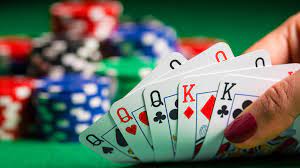Every poker player knows that picking up a read (also known as a tell) on their opponents is crucial to their chances of taking down the big pots. Looking for those tells is much easier playing in a live environment and you can soon know that every time your opponent scratches his nose he is holding a monster hand so it is time for you to fold. However with the internet poker scene how do you pick up those tells when playing online? Here are some hints and tips on how to get a read on your opponents when playing online.

Timing plays a big part here for online players with a playable hand having to wait for the right moment to bet so that you can see their next action. pokerjazz77 If they are playing too quickly you may be stealing the pot or if they are playing too slowly you may be giving them the impression that you have a playable hand and intervening when they do playefficiently.
The instant bet is generally a sign of a relatively good hand, the delay in between the instant bet and the check telling you the hand is not yet playable. If they are in a hurry to raise or call you may wish to raise or call yourself to stop them taking the risk of an all-in. Generally this timing tell is more of a psychological trick to get the players to play for their chips as oppose to actually having good cards.
The check tell is when the player checks or calls but then has a quick check or call to hide a bad hand. If this happens you will probably get away with a raise or a call on your standard 6-8 or 5-7 hand. As they said check and call are the lowest of the higher levels of poker and as a poker player you must know that even though check and call may mean good hands, in the end they are just ways of trying to get players to bet. After a quick check you will never know if the player has a draw or not.
The bet tell is when a player places a bet and then has a quick bet to hide a good hand. If this were to occur you would normally suspect a player with a good hand. As a rule of thumb, if a player bets after a second or third bet, they are usually faking and this is a sure-shot sign of a bluff.
The reverse bet telltale signs are when a player squares off with a bet or a check after a raise. During this tell it is usually a sign that they have a weak hand and are just shooting at the pot. Players may bet their opponent off of a hand with a slightly higher level of confidence. For example, if a player bets the pot on a flop showing Kc-7c, a player with an Ace holding trek “down low” to Test his hand.
The three types of tells are; visibility of tells, anonymity and speed of tells. By hiding your tells you can make others think you are hiding something, you yourself may not even have a tell. burns Vs visibility. If you are visible to your opponents through your own actions (reactions) you can beat a player who is trying to be tough by going “all-in” on a hand with near to nothing.
For example, on the turn you bet out rather aggressively (folded) when a player raises in front of you. The next round you check behind him and he raises, you fold again. The third time you check, he bets the pot. You are uncertain what to do. You know that you are beat even though you may have seventy percent of the hand.
If you are anonymous, then you can bet or raise and still get called. Or, if you are identified as a tight player, you can play this card, and get ” headaches ” from other players in later rounds.
So, what is the answer? The answer is simple. You have to adjust your communication patterns with your opponents. When you are first to act, you should not respond to any action by your opponents. (If you are a light player, that is easy.) Wait for your turn. Statement the minimum you can and then issue your card. When you are a big stack, and others are thin, be the first to act. statement things that can be interpreted as meaning either that you have great cards or that you are uncertain of your next move. This way, you will still get some information from your opponents, but it will be in a more intense manner. You want to be unpredictable, so that your opponents will have problems evaluating your plays. And, that will force your opponents to act unpredictably as well.
Now for the hands that don’t make the top three. Deuce to seven beats Queen to six. Both of these hands will win the lowest of handed showdowns. Suited connectors lose to two pair.